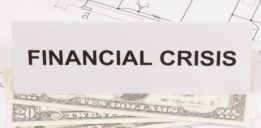Economic Growth “Temporarily” Slowing, But at What Cost?
Harvey and Irma are bad for business. Wall Street’s biggest investment bank has slashed economic growth (GDP growth) estimates by 30%, in what it feels is a transitory event.
But is it really? Beyond the economic growth rebound that’s expected from the rebuilding in Houston and South Florida, perhaps these events are more economically damaging than meets the eye.
For starters, Goldman Sachs Group Inc (NYSE:GS) chief economist, Jan Hatzius, announced that he was cutting Q3 GDP estimates to two percent annualized. This would leave growth precariously around the rate of inflation, so, in other words, not really “growing” (in real terms) at all. (Source: “Goldman Slashes Q3 GDP By 30% Due To Hurricane Disaster,” Zero Hedge, September 9, 2017.)
While Goldman Sachs believes that this drop in growth will be more than offset by positive growth from the rebuild, don’t discount the damage done to the economy. Contrary to Keynesian thinking, rebound economic growth does not mean everything is OK.
Also Read: 5 Signs of a U.S. Economic Collapse in 2017
The broken window fallacy, or the belief that money spent in a recovery from destruction helps the economy, is just that—a fallacy. If infrastructure tear-down and rebuilding really helped the economy, the government would just raze and rebuild cities at the onset of every recession. In reality, there are economic consequences beyond what can be measured or anticipated.
Let’s start with flood insurance. Most private insurers do not cover flood damage. The federal government does have a National Flood Insurance Program (NFIP), but it’s unclear how many people are actually covered by it. Being that the program is already at least $24.0 billion in debt (2014 numbers), it’s doubly unclear where the money is going to come from to pay out hundreds of billions of dollars in repairs.
Should the Republican Party (GOP) press to fund NFIP again, does Trump’s great infrastructure plan get affected? Remember his campaign promise to raise $1.0 trillion to help rebuild America’s bridges, dams, roads, etc. This may get trumped (pun intended) by the need to rebuild tens of thousands of homes in Houston and South Florida.

Remember the Oroville Dam and I-35W Mississippi River bridge collapses? How many of these disasters-in-waiting are there that will continue to languish in disrepair as Harvey/Irma suck up federal funds? This situation is guaranteed to have deadly consequences later on.
Then we have the insurers, who have taken a beating of late. This will not be a very profitable year for many. Insurer collective book values will drop, and premiums will rise to rebuild disaster reserves which have taken a pounding. Guess who pays for all of that?
Finally, there’s a prevailing assumption that everyone who left will come back. That’s not necessarily the case. Many folks can’t afford to come back, especially if they must build from scratch without flood insurance. The same banks that got whacked by Harvey/Irma may not be so keen to lend. Millions of people may relocate to cheaper locales, with less lavish lifestyles than before. That doesn’t sound economically bullish to me.
These are just a few reasons why Harvey and Irma are a net negative for the economy. Goldman Sachs pegs the number at a 30% hit to GDP growth for one quarter, with growth rebounding later. But, beyond the headline numbers, the hurricane devastation makes America weaker. Valuable capital will be siphoned into places that didn’t require it three weeks ago, to the collective nation’s detriment.
Scores of people didn’t return to New Orleans after Hurricane Katrina, and I expect the same will happen again, with the current natural disasters. With two-third of Americans saying they would struggle to raise $500.00 in an emergency, rebuilding expensive properties seems daunting.
Broken window fallacy be damned.






